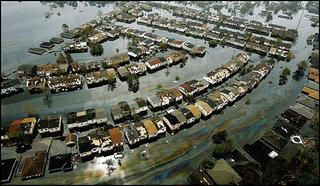
As the fallout from the most costly hurricane ever to hit America's shores continues, most folks aren't paying attention to whats around the corner. Katrina was merely the opening act in a long play (season) that could be the most intense the Gulf Coast has seen or experienced. For a city that celebrated past storms by throwing a party, the idea of a another category 3 or 4 storm hitting the region is far from everyone's mind in the fog of recovering from Katrina.
Dr. William Gray, professor of atmospheric science at Colorado State Univeristy in Fort Collins, has for years been tracking the hurricane activity worldwide with an emphasis on the Atlantic region. He has pioneered hurricane forcasting. So, after Katrina I thought it might be a good idea to read his annual forcast for this year's hurricane season. The bad news: the Caribbean is getting torn up. Here are some fast facts Gray points out in his forcast:
Information obtained through 31 August 2005 shows that we have already experienced 110 percent of the average full season Net Tropical Cyclone (NTC)4 activity. In an average year, 33 percent of the seasonal average NTC of 100 occurs before the end of August. We expect that by the time the 2005 hurricane season is over, we will witness seasonal tropical cyclone activity at near record levels.
The most intriging part of Gray's Report? He doesn't blame the increased storm activity on global warming. In fact he denounces it...
Many individuals have queried whether the unprecedented landfall of four destructive hurricanes in a seven-week period during August-September 2004 and the landfall of two more major hurricanes in the early part of the 2005 season is related in any way to human-induced climate changes. There is no evidence that this is the case. If global warming were the cause of the increase in United States hurricane landfalls in 2004 and 2005 and the overall increase in Atlantic basin major hurricane activity of the past eleven years (1995-2005), one would expect to see an increase in tropical cyclone activity in the other storm basins as well (ie., West Pacific, East Pacific, Indian Ocean, etc.). This has not occurred. When tropical cyclones worldwide are summed, there has actually been a slight decrease since 1995. In addition, it has been well-documented that the measured global warming during the 25-year period of 1970-1994 was accompanied by a downturn in Atlantic basin major hurricane activity over what was experienced during the 1930s through the 1960s.
Well, shucks. So we aren't getting abnormally high amount of hurricanes but the ones we do get are more intense than ever before? The Pew Center on Global Climate Change seems to think there may be a connection between global warming and high intensity hurricanes, although they are unwilling to confirm it as fact.
So for now it looks like the jury is still officially out on a direct link between intense hurricanes and global warming, although a majority of scientists do say, rather confidently, that increasing global temperatures will result in more intense storms (but not more frequent storms) and they will be more destructive as more coastlines are developed and populations increase.
I think we have to restore order and life in New Orleans, but maybe we could do better NOT developing New Orleans anymore than it has to be? After Dennis Hastert's comments yesterday who knows what people think. Regardless, we're in for an interesting September and October.
3 comments:
Nice site!
[url=http://rjxmihja.com/ogms/inlh.html]My homepage[/url] | [url=http://szrnoltj.com/nxkd/wvos.html]Cool site[/url]
Well done!
My homepage | Please visit
Well done!
http://rjxmihja.com/ogms/inlh.html | http://aearflqw.com/mlpt/xlzy.html
Post a Comment